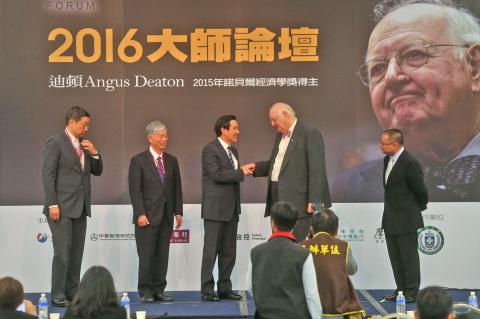Nobel laureate Angus Deaton yesterday lent support to basic income grants as part of government efforts to mitigate wealth and consumption inequality.
“The government should take care of people with low income and should be pushing basic income grants,” the economist told a forum at the Taipei International Convention Center.
Basic income grants, or guaranteed income, are a government-ensured guarantee that no citizen’s income falls below the level necessary to meet their most basic needs.

Photo: CNA
Advocates say the program is an efficient, effective and equitable solution to poverty that not only promotes individual freedom, but also keeps the beneficial aspects of a market economy in place.
Deaton, a professor of economics and international affairs at Princeton University, said that risk, even stationary risk, cumulates into inequality when shaped by rapid technical progress, globalization and a rapidly changing world.
“The larger the factor of shocks, the riskier the world becomes, the more potential there is for increases in inequality,” he said.
Deaton was awarded the Nobel Prize in Economics last year for his analysis of consumption, poverty and welfare, with the Economic Sciences Prize Committee saying that his work linking individual choices and aggregate outcomes had helped transform the study of microeconomics, macroeconomics and development economics.
Deaton last year said that there are still 700 million poor people in the world and they are “a constant reproach to all of us.”
Wealth inequality is likely to increase at a much faster pace unless there is some offset from an insurance arrangement under a range of personal and social mechanism that ties people together, Deaton has said.
Deaton has said that climate change and inequality are the two greatest challenges facing the world, adding: “I do worry about a world in which the rich get to write the rules.”
Deaton has also taken a keen interest in Taiwan, calling it “the home of saving” because people at all ages save a lot, just as all ages save little in the US.
He said he is not able to account for the phenomenon after examining housing, bequest and small business ownership needs.
Deaton rejected the link between Taiwan’s excessive savings and Confucianism, adding that South Koreans are also influenced by Confucius, but save less.

Sweeping policy changes under US Secretary of Health and Human Services Robert F. Kennedy Jr are having a chilling effect on vaccine makers as anti-vaccine rhetoric has turned into concrete changes in inoculation schedules and recommendations, investors and executives said. The administration of US President Donald Trump has in the past year upended vaccine recommendations, with the country last month ending its longstanding guidance that all children receive inoculations against flu, hepatitis A and other diseases. The unprecedented changes have led to diminished vaccine usage, hurt the investment case for some biotechs, and created a drag that would likely dent revenues and

Global semiconductor stocks advanced yesterday, as comments by Nvidia Corp chief executive officer Jensen Huang (黃仁勳) at Davos, Switzerland, helped reinforce investor enthusiasm for artificial intelligence (AI). Samsung Electronics Co gained as much as 5 percent to an all-time high, helping drive South Korea’s benchmark KOSPI above 5,000 for the first time. That came after the Philadelphia Semiconductor Index rose more than 3 percent to a fresh record on Wednesday, with a boost from Nvidia. The gains came amid broad risk-on trade after US President Donald Trump withdrew his threat of tariffs on some European nations over backing for Greenland. Huang further

CULPRITS: Factors that affected the slip included falling global crude oil prices, wait-and-see consumer attitudes due to US tariffs and a different Lunar New Year holiday schedule Taiwan’s retail sales ended a nine-year growth streak last year, slipping 0.2 percent from a year earlier as uncertainty over US tariff policies affected demand for durable goods, data released on Friday by the Ministry of Economic Affairs showed. Last year’s retail sales totaled NT$4.84 trillion (US$153.27 billion), down about NT$9.5 billion, or 0.2 percent, from 2024. Despite the decline, the figure was still the second-highest annual sales total on record. Ministry statistics department deputy head Chen Yu-fang (陳玉芳) said sales of cars, motorcycles and related products, which accounted for 17.4 percent of total retail rales last year, fell NT$68.1 billion, or

HSBC Bank Taiwan Ltd (匯豐台灣商銀) and the Taiwan High Prosecutors Office recently signed a memorandum of understanding (MOU) to enhance cooperation on the suspicious transaction analysis mechanism. This landmark agreement makes HSBC the first foreign bank in Taiwan to establish such a partnership with the High Prosecutors Office, underscoring its commitment to active anti-fraud initiatives, financial inclusion, and the “Treating Customers Fairly” principle. Through this deep public-private collaboration, both parties aim to co-create a secure financial ecosystem via early warning detection and precise fraud prevention technologies. At the signing ceremony, HSBC Taiwan CEO and head of banking Adam Chen (陳志堅)